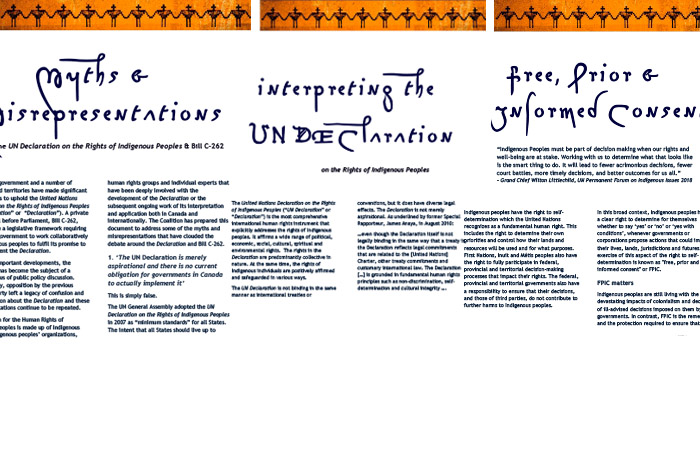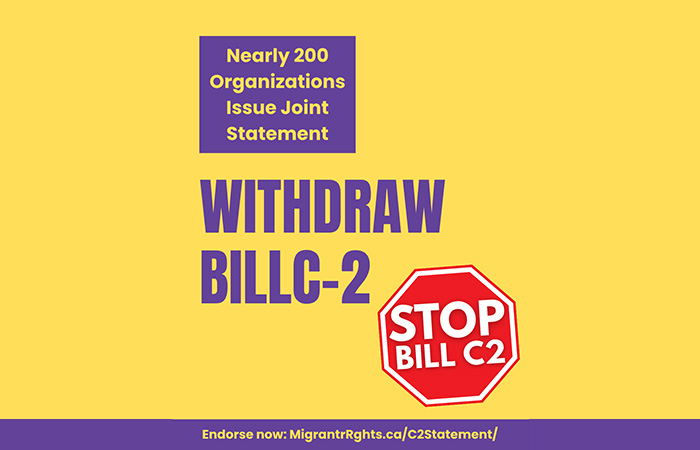
CFSC joins call for an independent inquiry into the case of Hassan Diab
May 15, 2018
New fact sheets explain Indigenous rights issues
July 4, 2018Canadian Friends Service Committee has written to all Senators to express our support for Bill S-251, which would abolish mandatory minimum sentencing. Read our open letter below, and, if so led, scroll down to find out how to easily email your own letter to Canada’s Senators.
Open letter
Dear Senator,
I am writing on behalf of Canadian Friends’ Service Committee, the peace and justice arm of the Religious Society of Friends (Quakers) in Canada. We are contacting you to express our support for Bill S-251, which would allow judges the discretion to waive mandatory minimum sentences when the circumstances warrant it. We ask you to support this bill.
This bill will enable judges to take into account individual circumstances and exercise compassion when making sentencing decisions, aligning sentences with Canada’s principles of justice, fairness and proportionality. In addition, judicial discretion will save costs and reduce delays in the criminal justice system.
Quakers have a long-standing commitment to developing a criminal justice system that is truly just. This dates back to the experiences of early Quakers who were subject to religious persecution including imprisonment, and to Quakers like Elizabeth Fry who visited prisoners and witnessed the harm that imprisonment can cause. We believe that it is fundamentally necessary to address the root causes of criminal activity. We have seen many restorative justice programs that turn criminal harm into a transformative experience. Such programs can help everyone affected find ways to create or discover meaning and to move forward in positive directions after a harmful event. This is the sort of justice system that we believe is needed.
While mandatory minimum sentences have a certain broad appeal, like any “one size fits all” solution, there will inevitably be circumstances where a reasonable person will find them to be unjust. Mandatory minimums restrict judges from tailoring sentences that are just, particularly for vulnerable and marginalized individuals. Furthermore, evidence overwhelmingly shows that they are ineffective in the main justification that is usually given for them: as a deterrent.
This bill will allow judges to waive mandatory minimum sentences when the circumstances warrant doing so. Mandatory minimum sentences have contributed to a variety of widely-acknowledged problems in the justice system:
- by removing much of the incentive to plea-bargain (since there is no flexibility in the bottom line of the sentence), they burden the court system with additional trials, contributing to delays in the system;
- by requiring incarceration, they eliminate the opportunity to use community-based justice programs that are often more effective in reintegrating people into their communities in healthy ways and reducing future crime;
- they are expensive: the costs of incarceration are well over $100,000 per inmate per year (according to the Office of the Correctional Investigator). Many alternatives are far less expensive;
- they lead to appeals and challenges that are themselves expensive and further tie up the court systems. According to the Justice Department, 68% of current charter challenges it is tracking relate to mandatory minimum sentences. Most such challenges have been successful, and three have already gone to the Supreme Court of Canada; and
- they contribute to the over-representation of vulnerable and marginalised people (such as Indigenous people, racialised people, and people with mental health issues) in the prison system. For this reason, Call to Action 32 of the Truth and Reconciliation Commission has called for their removal.
We support Bill S-251 and call on all Senators to open the door to support this bill, and allow our judiciary to exercise their own common sense and compassion in sentencing decisions. Passage of the bill by both the Senate and the House of Commons would contribute to a better justice system in Canada.
Sincerely,
Derek Nice,
Clerk, Canadian Friends Service Committee (Quakers)
Download this open letter in PDF
Write your own letter
Click here to open an email to all of Canada’s Senators or copy all of the senators’ email addresses below and paste them into the To or BCC field. Then write your email – a sample is below but it’s best if you write something short and personalized.
pierre-hugues.boisvenu@sen.parl.gc.ca, robert.black@sen.parl.gc.ca, raynell.andreychuk@sen.parl.gc.ca, salma.ataullahjan@sen.parl.gc.ca, denise.batters@sen.parl.gc.ca, diane.bellemare@sen.parl.gc.ca, WandaThomas.Bernard@sen.parl.gc.ca, lynn.beyak@sen.parl.gc.ca, doug.black@sen.parl.gc.ca, Gwen.Boniface@sen.parl.gc.ca, Patricia.Bovey@sen.parl.gc.ca, Yvonne.Boyer@sen.parl.gc.ca, Patrick.Brazeau@sen.parl.gc.ca, larry.campbell@sen.parl.gc.ca, claude.carignan@sen.parl.gc.ca, daniel.christmas@sen.parl.gc.ca, anne.cools@sen.parl.gc.ca, jane.cordy@sen.parl.gc.ca, Rene.Cormier@sen.parl.gc.ca, Mary.Coyle@sen.parl.gc.ca, jean-guy.dagenais@sen.parl.gc.ca, PierreJ.Dalphond@sen.parl.gc.ca, Donna.Dasko@sen.parl.gc.ca, dennis.dawson@sen.parl.gc.ca, joseph.day@sen.parl.gc.ca, colin.deacon@sen.parl.gc.ca, Marty.Deacon@sen.parl.gc.ca, Tony.Dean@sen.parl.gc.ca, line.tessier@sen.parl.gc.ca, percy.downe@sen.parl.gc.ca, norman.doyle@sen.parl.gc.ca, Michael.Duffy@sen.parl.gc.ca, Renee.Dupuis@sen.parl.gc.ca, lillian.dyck@sen.parl.gc.ca, nicole.eaton@sen.parl.gc.ca, art.eggleton@sen.parl.gc.ca, Eric.Forest@sen.parl.gc.ca, linda.frum@sen.parl.gc.ca, george.furey@sen.parl.gc.ca, Raymonde.Gagne@sen.parl.gc.ca, rosa.galvez@sen.parl.gc.ca, marc.gold@sen.parl.gc.ca, stephen.greene@sen.parl.gc.ca, Diane.Griffin@sen.parl.gc.ca, peter.harder@sen.parl.gc.ca, Nancy.Hartling@sen.parl.gc.ca, Leo.Housakos@sen.parl.gc.ca, mobina.jaffer@sen.parl.gc.ca, serge.joyal@sen.parl.gc.ca, Frances.Lankin@sen.parl.gc.ca, carol.smith@sen.parl.gc.ca, michael.macdonald@sen.parl.gc.ca, ghislain.maltais@sen.parl.gc.ca, fabian.manning@sen.parl.gc.ca, elizabeth.marshall@sen.parl.gc.ca, martin@sen.parl.gc.ca, sabi.marwah@sen.parl.gc.ca, paul.massicotte@sen.parl.gc.ca, MaryJane.McCallum@sen.parl.gc.ca, elaine.mccoy@sen.parl.gc.ca, thomasjohnson.mcinnis@sen.parl.gc.ca, paul.mcintyre@sen.parl.gc.ca, Marilou.McPhedran@sen.parl.gc.ca, marie-francoise.megie@sen.parl.gc.ca, terry.mercer@sen.parl.gc.ca, grant.mitchell@sen.parl.gc.ca, percy.mockler@sen.parl.gc.ca, Lucie.Moncion@sen.parl.gc.ca, jim.munson@sen.parl.gc.ca, richard.neufeld@sen.parl.gc.ca, thanhhai.ngo@sen.parl.gc.ca, senator.oh@sen.parl.gc.ca, Ratna.Omidvar@sen.parl.gc.ca, Kim.Pate@sen.parl.gc.ca, dennis.patterson@sen.parl.gc.ca, Chantal.Petitclerc@sen.parl.gc.ca, don.plett@sen.parl.gc.ca, rosemay.poirier@sen.parl.gc.ca, Andre.Pratte@sen.parl.gc.ca, David.Richards@sen.parl.gc.ca, pierrette.ringuette@sen.parl.gc.ca, raymonde.saint-germain@sen.parl.gc.ca, judith.seidman@sen.parl.gc.ca, Senator.Sinclair@sen.parl.gc.ca, larry.smith@sen.parl.gc.ca, SenatorStewartOlsen@sen.parl.gc.ca, scott.tannas@sen.parl.gc.ca, david.tkachuk@sen.parl.gc.ca, betty.unger@sen.parl.gc.ca, josee.verner@sen.parl.gc.ca, pamela.wallin@sen.parl.gc.ca, davidwells@sen.parl.gc.ca, Howard.Wetston@sen.parl.gc.ca, senatorwhite@sen.parl.gc.ca, YuenPau.Woo@sen.parl.gc.ca
Sample email
Dear Senator,
I am writing in support of Bill S-251, which would allow judges the discretion to waive mandatory minimum sentences when the circumstances warrant it. I urge you to vote in support of this bill.
I believe that this bill will produce cost savings and reduce delays in the criminal justice system, in addition to enabling judges to consider an individual’s circumstances and to exercise compassion and fairness in sentencing decisions. A “one size fits all” sentencing structure can never be fully just, and research has shown that mandatory minimum sentences do not effectively deter criminal activity.
The court system is slow and costly, and our prisons and jails are far more costly than many alternative forms of justice, some of which also have significantly higher rates of success in reintegrating people into the community. Tying the hands of judges so that they cannot exercise discretion in sentencing when it is warranted carries significant financial and social costs to our country.
Call to Action 32 of the Truth and Reconciliation Commission also called for mandatory minimum sentences to be removed, because they contribute significantly to the over-representation of Indigenous people in our jails and prisons.
Please enable our judiciary to exercise their own common sense and compassion in sentencing decisions, by exercising your vote in support of Bill S-251.
Sincerely,




